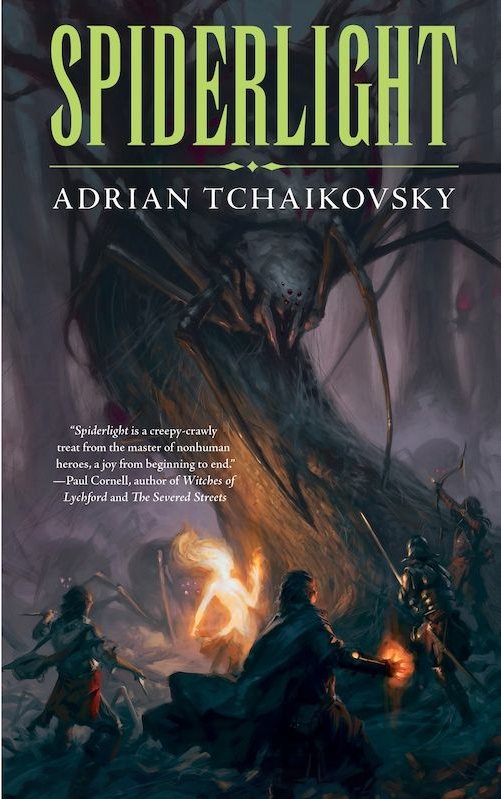British author Adrian Tchaikovsky’s stand-alone fantasy novel Spiderlight is a rip-roaring, old-fashioned heroic fantasy romp that also messes playfully with some of the genre’s more outdated conventions.
The initial set-up comes straight out of the Dungeons and Dragons tie-in novels of the 1980s: an adventuring party (a cleric of the one true God, an arrogant knight, a speedy ranger, a thief doing penance, and a somewhat psychopathic wizard) are on a quest to destroy a literal Dark Lord with a ridiculous name (Darvezian), and must fulfill the torturous steps of an obscure prophecy to do so. So far, so clichéd, so much so that I almost threw the book away, never to return.
Which would have been a terrible mistake.
Tchaikovsky uses this rather worn starting point as a launchpad to mess with our expectations, and critique the kind of black-and-white, good-versus-evil thinking that underpins a lot of fantasy fiction. It does this not with unrelenting grimness, gore, and sex (although there is a little bit of all of these) but playfully, with a dark sense of humour, and a plot twistier than the back end of an agitated snake.

His main vehicle for playing with these clichés is our unpronounceable protagonist, Nth. Nth starts the story as a spider, living in the forest and doing typical spider things like worshipping his brood-mother and eating the flesh of Men that trespass upon her domain. Sadly for Nth, the heroes’ prophecy calls for one of his mother’s fangs to be fashioned into a weapon, and for her to show those heroes the way to the Dark Lord’s home so they can kill him with it. In a compromise with darkness that sets the scene for the internal and external conflicts to come, Dion, the cleric leading the party, allows her party’s wizard to transform Nth into the shape of a man, magically endowed with his spider-mother’s memories with no choice but to follow their orders and become their guide.
Nth is an interesting character, a childlike figure to start with but one who grows more and more complex throughout the novel. We get to see him grow up through an extremely accelerated adolescence, going from someone who knows nothing to someone who is able to view human society through an astute outsider’s lens. He is not the only character who develops in interesting ways; Spiderlight’s heroes may sound like clichés, but each one is given room to breathe and develop beyond their unpromising tropes, which in turn allows the plot to spin and twist in unexpected directions. Tchaikovsky also deserves a nod for his portrayal of female characters and gender relations; one of his subplots concerns a relationship between a man and woman that borders on the abusive, and he is astute in showing the psychology at work on both sides. The leader of the heroes is also a woman, strong and independently-minded and more than capable of holding her own.
Spiderlight was able to appeal to the nostalgic kid in me, the one who sat up under the bedcovers all night with a torch and a stack of Dragonlance novels, while providing just enough intelligent dissection of the fantasy genre to satisfy the older, more cynical reader I have become. Tchaikovsky allows our preconceptions to do the hard labour of his world-building for him, leaving him free to focus on the big issues he chooses to tackle: free will, human nature, belief, gender roles, and friendship. At only 300 pages, Spiderlight is a breathless rush that never outstays its welcome but kept me thinking about its themes and characters long after I finished reading. It feels like joining a Dungeons and Dragonscampaign just as it reaches its climactic final act, but a campaign ran by a Dungeon Master with a wicked sense of humour and a lesson or two to impart from behind the screen.
A review copy of Spiderlight was provided by Tor. It will be available on August 2nd, preorder now!